Hyvää päivää,
Lapland (or Sápmi in the Sámi language) stretches over four countries: Norway, Sweden, Finland and the Kola peninsula of Russia. The region is bounded by the Norwegian Sea on the west, the Barents Sea to the north and the White Sea in the east. This region of approximately 150,000 square miles mostly lies north of the Arctic Circle. It is sparsely inhabited; about two million people live there. Lapland is at the same latitude as Siberia and Greenland with a subarctic to continental climate. Temperatures can be a few degrees higher, warmed by the warm air masses coming from the Atlantic, itself warmed by the Gulf Stream… Finally, the term “higher” does not mean “hot” ! In winter, the average temperature is between 14°F and -4 °F, but it can occasionally go down to -22°F, and even -40°F… Sápmi is covered with vast wild areas and snow-covered forests. Finnish Lapland looks in all respects like our childhood dreams, a white paradise ! In fact, 70% of the Finnish territory is covered with forests, and only 10% is cultivated… At this time of the year, the summer sunshine of 24 hours has given way to the shortest days with less than 3 hours of daylight depending where you are… The sun will remain very low on the horizon, but I am already looking forward to myriad winter adventures and activities, snowshoeing, tobogganing, sledding, snowmobiling, etc. And you ?
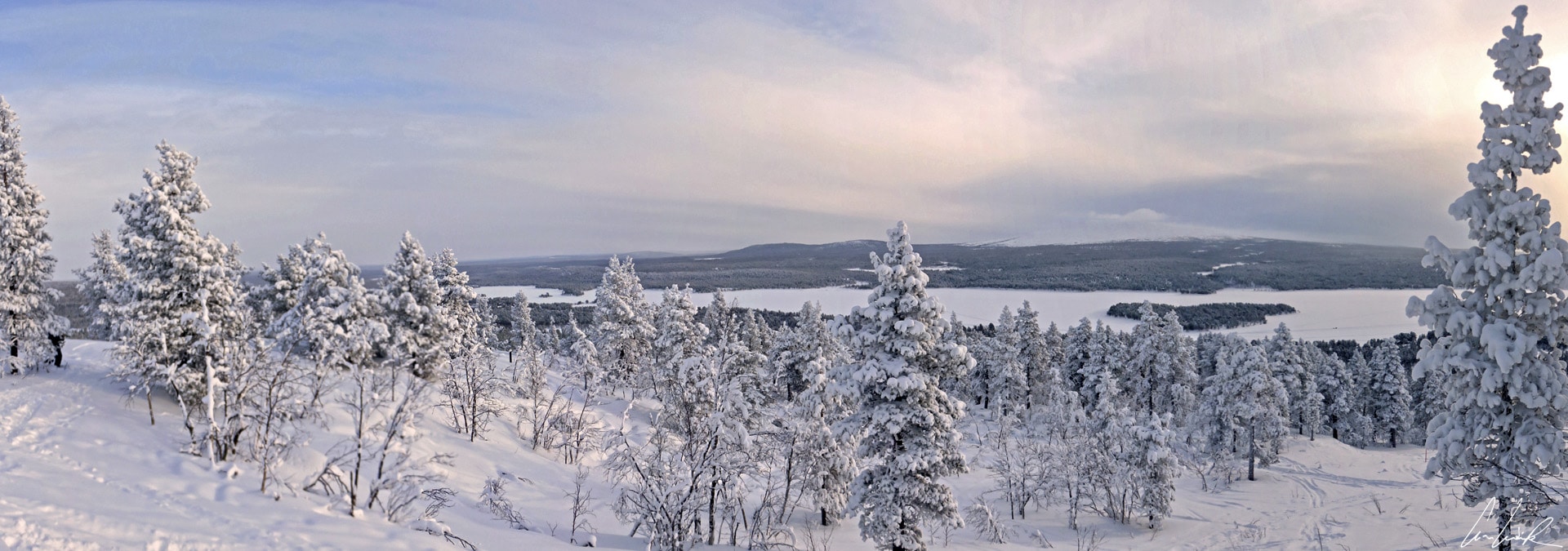
Enontekiö: visit true Finnish Lapland
Enontekiö (Eanodat in Northern Finish Lapland) is a municipality situated in the far northwest of Finland, squeezed between Sweden and Norway. This elongated municipality (more than 160 kilometers long) is the third largest municipality in Finland by its total area of about 3,100 square miles, corresponding to the size of Corsica. It has just 2,000 residents giving a density of 0.6/sq mi. Almost a third of Enontekiö‘s inhabitants live in Hetta, the administrative center of Enontekiö, located in the southeast of Enontekiö. The village of Hetta is idyllically located on the pristine waters of Lake Ounasjärvi and not far from the magnificent Pallas-Yllästunturi National Park. It is the third largest national park in Finland covering an area of 394 sq miles. Most villagers work in tourism, services, reindeer husbandry and traditional crafts. The year has a well-defined season, and local life in Lapland follows the cycle of Mother Nature. The contrasts between the four seasons dictate the pace… After Christmas, the village plunges into silence that will be broken only by the first rays of the sun. Sun that will also bring the first tourists to revive this small Lapland village.
« Tuesday, January 11th.
Sunrise: 11:14 am; sunset: 11:41 am.
27 minutes of sunshine.
The temperature was a little warmer, with a minus four degrees Fahrenheit. However the cold was biting because of the little wind blowing ».
(Olivier Truc, French author – Forty Days Without Shadow)
In the heart of the Lapland mountains and wilderness, man has all the space he needs to breathe the purest air in the world in the last unspoiled wilderness in Europe. Among these endless forests and bare summits, we find peace, tranquility, and serenity. Silence and space: the atmosphere of this region is conducive to peace and contemplation…
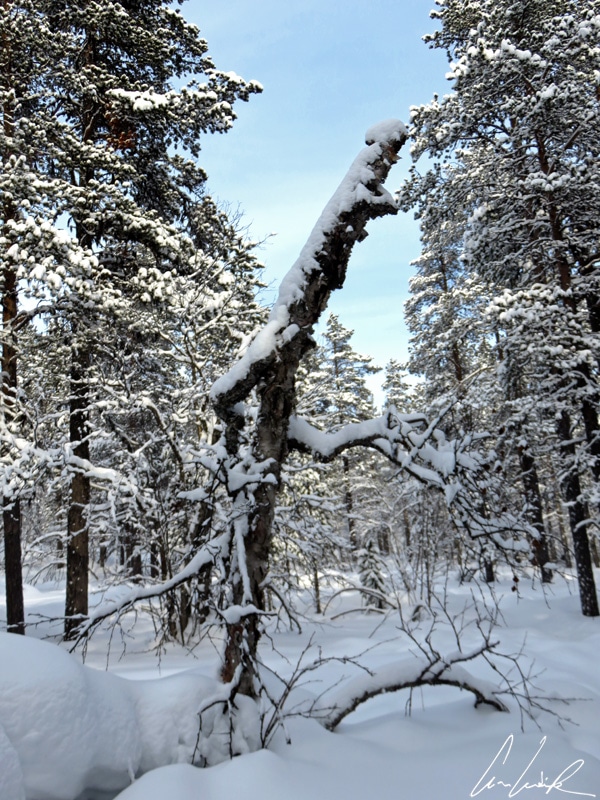
Take a white hike: snowshoeing in Lapland
Snowshoeing is a great way to experience Finland’s wintry wildernesses, enjoy the fresh and clean air and get some exercise. A snowshoe ride takes us to Jyppyrä hill at about 2,200 feet above sea level. The small forest paths twist and turn among magical scenery which appears as if it has been torn out of the pages of a children’s story book.For our efforts we are awarded a breathtaking view of Lake Ounasjärvi and its surroundings. Close to “Järvi” (lake) Ounasjärvi stands Pyhäkero at about 2,340 feet, the highest point in the northern part of the Pallas-Yllästunturi National Park. On the bare summit of Pyhäkero in the Ounastunturi massif only the most resistant plants and bushes survive. In the uplands, birch trees cover the mountain slopes, and the plains are home to lush pine forests. As for the northernmost spruces, they only grow at “Pahakuru“, meaning literally “the throat of the devil” located at about 31 miles south of Hetta. The dry dead trees called “Kelo” in Finnish, are a characteristic of Lapland’s unique topography, and remind us of the passing of time and the harsh natural conditions that Mother Nature confers on the area and its inhabitants…
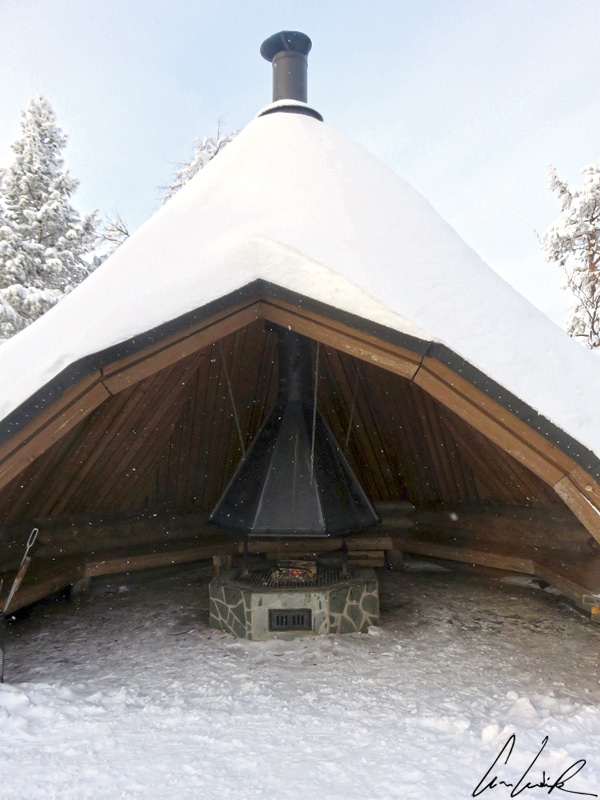
What a beautiful moment of sharing in the magical and mythical Lapland ! Sheltered by the fire in a “Kota” at the top of the hill Jyppyrä, we grill our “makkara” (the famous grilling sausages, a must do snack.) The “Kota” is a Lappish version of the Native American tepee, a temporary dwelling inside which Sámi doctors practiced their ancestral healing rituals. Connection with the spirit world is reached through an opening at the top of the Kota. Inside this mythical place, we sip a delicious “glögi“, the Finnish glühewine. It is a warm alcoholic spice-flavored berry juice and accompanied by “piparkakku,” a shortbread biscuit flavored with cinnamon, ginger, cloves and orange peel. In Lapland and Finland, there is a multitude of berries with unique flavors: cranberries and blueberries, but also cloudberrie,s similar to blackberries and called “Lakka” in Finnish or “Hilla” in Sámi. These small edible yellow-orange berries ripen in early autumn and are found in peat bogs and marshes. Lakka is a rhizomatous plant that grows between 4 and 10 inches high. During good harvest years, Finland people can collect about 20 pounds of berries per inhabitant ! The snow has stopped, and it is time to go back down to Hetta.
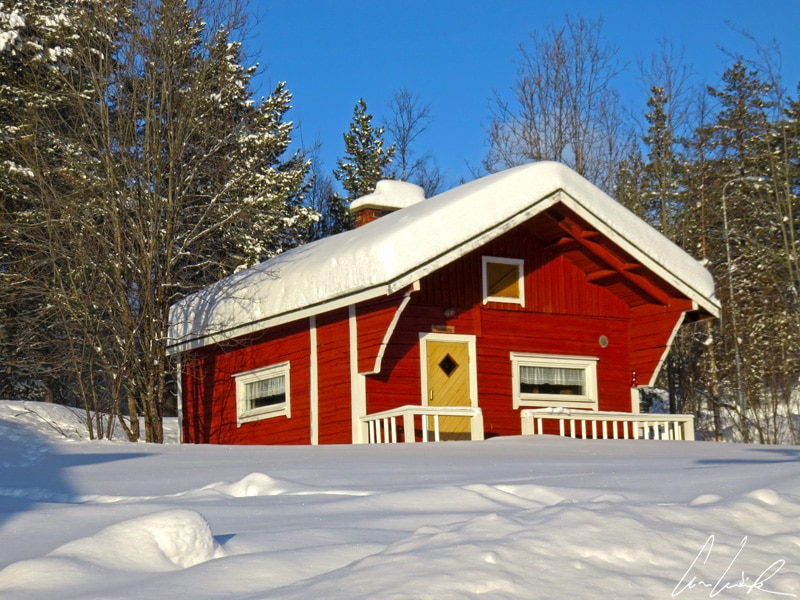
Welcome to the ice hotel in Enontekiö
The Evangelical Lutheran Church of Enontekiö in Hetta (in Finnish: Enontekiön Kirkko) is visible from afar and distinguished by its red tile roof. Built on a small butte, the church was designed by architect Veikko Larkas and inaugurated in 1952. Inside, the nave is decorated with a magnificent altarpiece made by Uuno Eskola in 1951 and representing “Jesus blessing the people of Lapland”. The altarpiece is about 46 feet high and 28.5 feet wide, almost completely covering the back wall. The church is registered on the list of Finish cultural sites of national interest. After a walk in the cold, there is nothing better than the warmth of a beautifully decorated wooden house with with Sámis dolls wearing their beautiful colorful costumes. They proudly wear their knitted gloves and deer boots. The traditional wooden houses are very often painted in Falun red color which is made from the slag of Falun’s copper mine in Sweden. Red Falun color is known as punamulta (red ground) in Finland. The slag contains iron oxide silicates, copper compounds and zinc. The color of the paint can be different depending on the burning degree of the oxide, ranging from almost black to a bright red.
« It’s red house
On the hillside
We get there by snowmobile
We don’t knock at the door
Those who live there
Threw away the keyLet’s meet together
After a polar night
Let’s come and sit
Around a delicious “poronkäristys”.
Tout le monde est là
Everybody is here
At five o’clock in the evening ».
(Adaptation inspired by Maxime Le Forestier, a French Singer)
Under a gray sky, I contemplate the outside surroundings; the landscape takes the appearance of a monochrome canvas dotted with small colorful Finnish houses. In this soft outdoor light, everything is crystallized… a beautiful winter miracle !
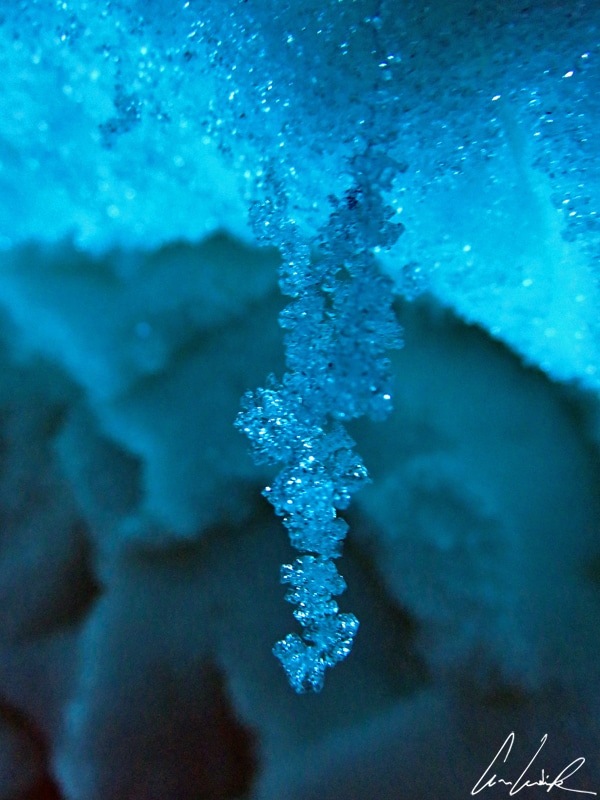
Where are we going to spend the night ? Hum, um and what about making a reservation at the ice hotel ? Over the last 20 years the village built a real ice hotel composed of several rooms with colorful lighting to attract tourists. After the arctic cold of the blue entrance there follows the warmer and heartening atmosphere of the bar-restaurant in an orange color, then the “Green Room” dear to French film director François Truffaut ! Why green ? Well, it is obviously the hottest trend (elected color of the year for 2017, according to Pantone) and also the guarantee of an intimate room, calm, relaxing and promoting well-being… Finally at -4°F, I am not sure of anything ! The construction starts in November, spans two weeks and utilizes 4 or 5 workers. The technique is clever. First inflate a balloon and then use a snow cannon (fed water from the lake) to project snow onto the balloon. Once the snow is frozen, deflate the balloon… and reuse it for the next room ! The polar night wraps Hetta in a veil of darkness; I hear dogs barking; the cold tingles my cheek… A quiet and peaceful evening announces itself in this atmosphere at the end of the world.

Discover dog sledding in Lapland
In winter, the landscape of Lapland changes dramatically. Freezing lakes become roads for snow scooters and sleds (dog or reindeer.) Winter Lapland offers you the best sled rides in Finland: you have a choice between a sled pulled by a group of happy sled dogs and a sled pulled by a reindeer, a cousin of the famous Rudolph the faithful companion of Santa Claus. These two formulas allow the visitor to wander in the wilderness through pretty snowy landscapes, taking in breathtaking sceneries.
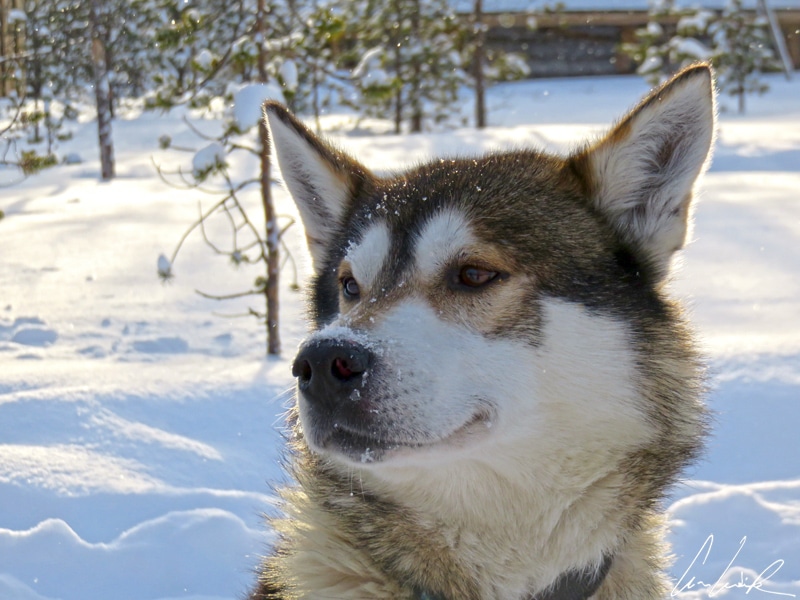
We arrive at a kennel hosting up to 171 dogs. These dogs travel on average 1,500 miles during the winter season. The farm consumes one ton of meat a month not counting croquettes. For now, everything seems calm; everyone sleeps quietly in his niche. To successfully assemble a dog sled team involves picking dogs with in excellent physical condition. Whatever their race, they must have common physical characteristics:
- Strength: They need the energy to pull the sled and its occupant.
- Endurance: they can travel several hundred of miles in a single expedition.
- Withstand the cold: these dogs can spend long weeks in a snowy and cold environment. A sled dog does not hold his paws at 98.6°F as this would waste heat, wet his coat, and risk frostbite. Instead, his skin temperature, precisely regulated by vasomotor reaction, drops to around 32°F in the paws and muzzle.
- Speed: a dog can reach a top speed of 20 mph.
- Obedience: sled dogs are selected for their ability to respond to the orders of the “musher”.

The six beautiful dogs of our team, all of the same sex (or neutered females mixed with males), stamp their feet excitedly. We can feel their impatience to assault this wild and hostile environment (as evidenced by the sign “Be aware of wolves“). Our guide raises his arm in a sign of departure, and here we are, sliding along the snow-covered paths ! The winter landscape around us is endless! Thousands of pines covered with snow stand on either side of our ride.As the lyrics of the song “Le paradis blanc” by French singer Michel Berger say,
« I’ll go to sleep in the winter paradise
Where the nights are so long that we forget the weather
All alone with the wind
As in my childhood dreams ».
I took the role of the musher, the driver of the team… But I quickly understood that the dogs know the trip by heart, and I let myself just be pulled. The dogs are strong, and our sled seems to be featherweight to them. It is very impressive, and you quickly learn to control the break, and not the accelerator, of the sled… The vastness of Lapland is the idyllic place to empty your soul and mind of any polluting thoughts, wandering in this wilderness with the feeling of being one with Mother Nature, is no doubt the key attraction of Lapland. The speed, the cold, the beautiful scenery transports me; I am overwhelmed by a feeling of fullness. Like all experiences, you have to see it and feel it yourself to understand. Words fail to describe what you feel when you are on top of a hill, and a beautiful landscape unfolds in front of your eyes: the emotion gives you goose bumps and sends a tingle down your spine. You stand in silence gazing at the snowy surrounding all around.
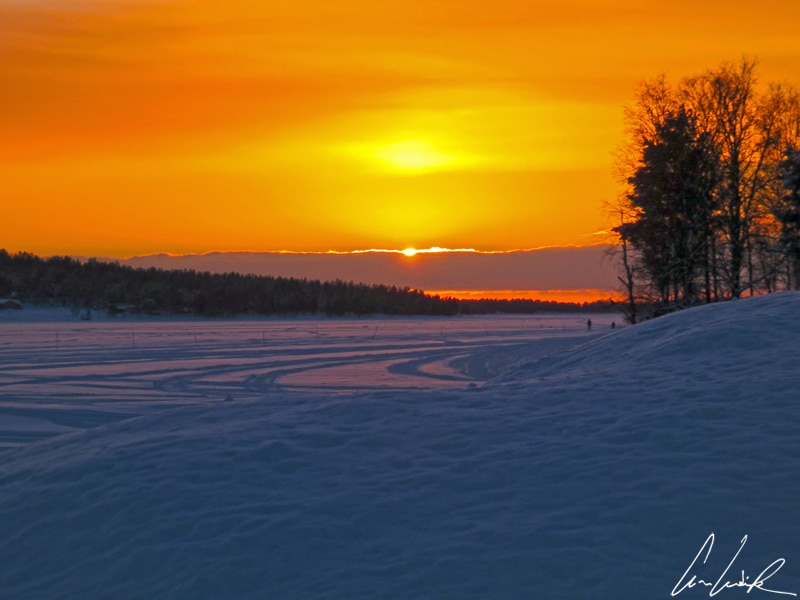
The glowing sun just above the horizon: the sunset is beautiful… the evening light and dawn (Dawn Light – Máddji) are thrilling in this season ! But it is time for everyone to return to their cozy home (home sweet home) to enjoy the delicious traditional soup called “lohikeitto” that consists of salmon, potatoes, and dill with cream… Tonight after this escapade, I am so hungry, I could eat a horse… what about a good “poronkäristys” (a stew of reindeer with mashed potatoes and lingonberry jam) ?
Discover my others articles about Lapland
- Lapland, cradle of Sámi Culture
- Lapland, Aurora Borealis Paradise
- Lapland: Northern lights like you’ve never seen them before!
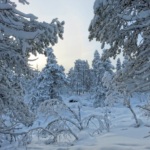
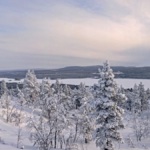
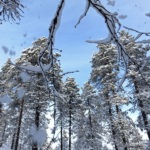
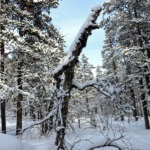
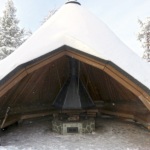
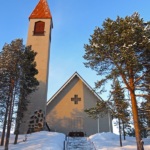
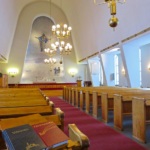
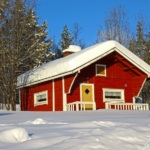
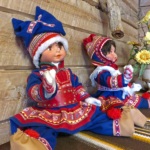
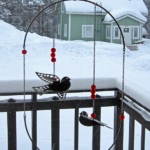
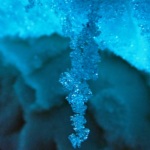
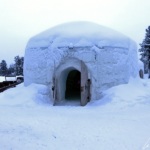
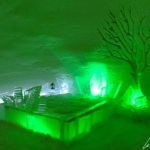
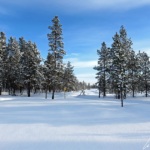
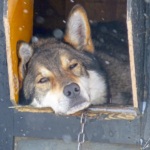
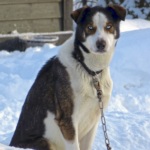
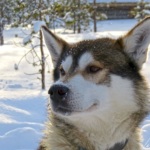
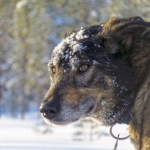
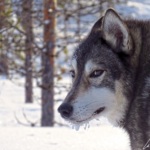
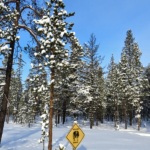
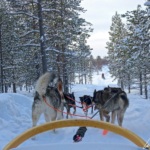
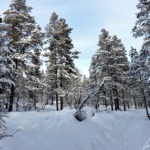
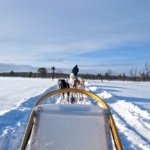
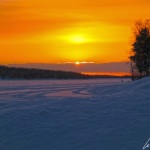
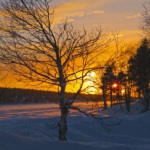
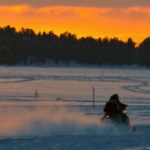
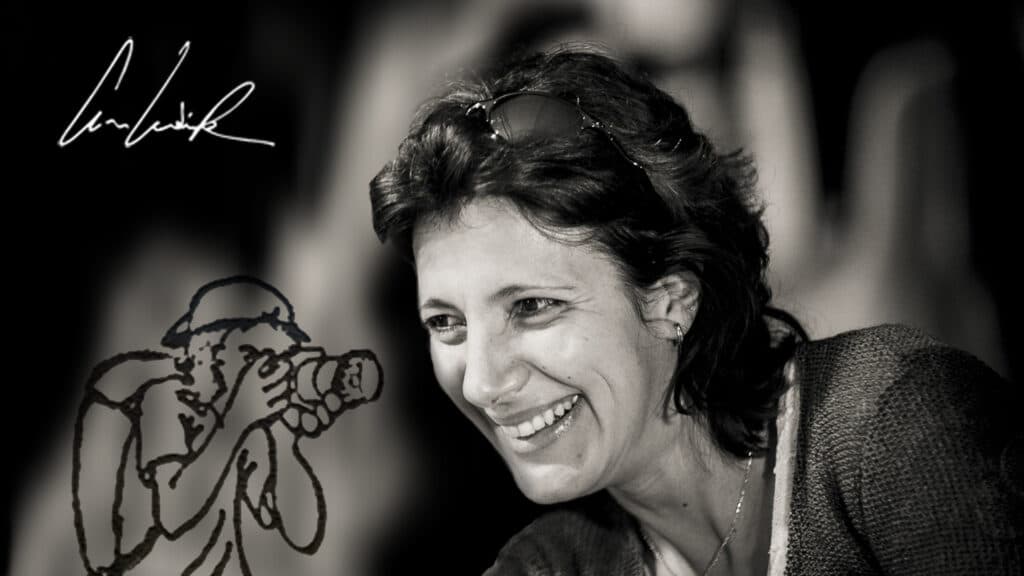

What a beautiful and remote winter wonderland! Was not too familiar with the expansive stretch of wilderness, until reading your post. What a lovely eco-friendly destination in the world to visit. Thanks for sharing your amazing photos. 🙂
Thank you 🙂 Lapland is as close as reality gets to those who dream of a winter wonderland ! It is an ultimate destination for travelers whose adventurous spirit craves purity in nature 😉
Winter wonderland indeed! Your photographs seem to depict landscapes from fairytales. Very evocative!
It is the ultimate destination for travelers whose adventurous spirit craves purity in nature and an authentic arctic experience 😉
What wonderful pictures of a stunningly beautiful landscape. On a hot day in Australia they have made me feel a little bit cooler.
Ha, ha 🙂 Winter season is a GREAT time to visit Lapland ! You can see for miles but all you will hear is your own breathing and the snow crunching under your boots…
It’s always such a joy to experience Mother Nature, up close and personal, at here best!! This gives me such great appreciation for our planet!! You took some really awesome pictures!! Great blog post!! I really enjoyed reading this!!
Thank you 🙂 Lapland is a winter wonderland of majestic beauty and tranquillity. It is the biggest wilderness area of the continent. It is an “exotic” destination that offers exciting contrasts and a lot of experiences 🙂
Awesome! I am from Finland but have never been to Lapland in winter 🙂
Ha, ha, you definitively have to plan a visit !! Forget – if you can – Father Christmas. He may be the main attraction for the vast majority of visitors crossing the Arctic Circle over the next few weeks, but Lapland has a lot more to offer than elves and grottos. It is an intensely beautiful landscape of snow-bound forests, frozen lakes and vast expanses of tundra… Don’t worry about the low temperatures and go explore all the activities winter in Lapland offers. The fun you’ll have will keep you warm for hours !
This is extremely beautiful! I have always wanted to visit Finland, I have a pen pal there! I also loved learning a little bit about the sled dogs!
It is really an intensely beautiful landscape of snow-bound forests, frozen lakes and vast expanses of tundra ! Dog sledding is, no doubt, a classic way to experience Arctic nature 🙂
Omg!! I can’t believe that I am looking at the real pics of Lapland.. They are so amazing and you captured the beauty so well.. wish to go to Lapland soon.. love your blog !
Thank you ! I believe everyone should go at least once in their life ! Lapland is beautiful in every season but the ultimate winter experience is of course at the start of the year when it’s freshly snowed in and so high, your knees get quite the exercise 😉
I don’t miss the cold Finnish winters a lot but this post made me miss my home country. So beautiful! Nowadays I’m a vegetarian but poronkaristys (reindeer stew) is soooo yummy!
Ha, ha winter in heart of Lapland… Beeing like frozen cotton candy and being pinched in the cheeks. But it’s also like a fairytale world 😉 I’ve experienced a thrilling adventure among snow-clad trees: feel the surrounding serenity and listen to the silence. A winter wonderland, inevitable to love !
Truly a winter wonderland. Your piks tell that its a very calm and serene place.
Tt is so true ! You have to experience the serenity of Arctic nature on snowy trails in Lapland 😉
The mysterious north! I love winter places and would surely like to go and experience one of these subartic regions at least once. You pics are beautiful.
Thank you 🙂 Lapland in winter is a magical experience ! It is quick and easy to walk out of the village itself, and set forth into the beauty of Lapland’s forests, fells, frozen lakes and rivers.
I am a tropical girl at heart and is never built for winter, but this looks so magical! I love how cozy it feels and how this place is such a winter wonderland. I would love to visit it one day!
Yes, it gets cold in Finland in the winter… Just need to wear five hundred layers and look like the Michelin Man 😉 and then you’ll truly appreciate the serenity of Lapland.